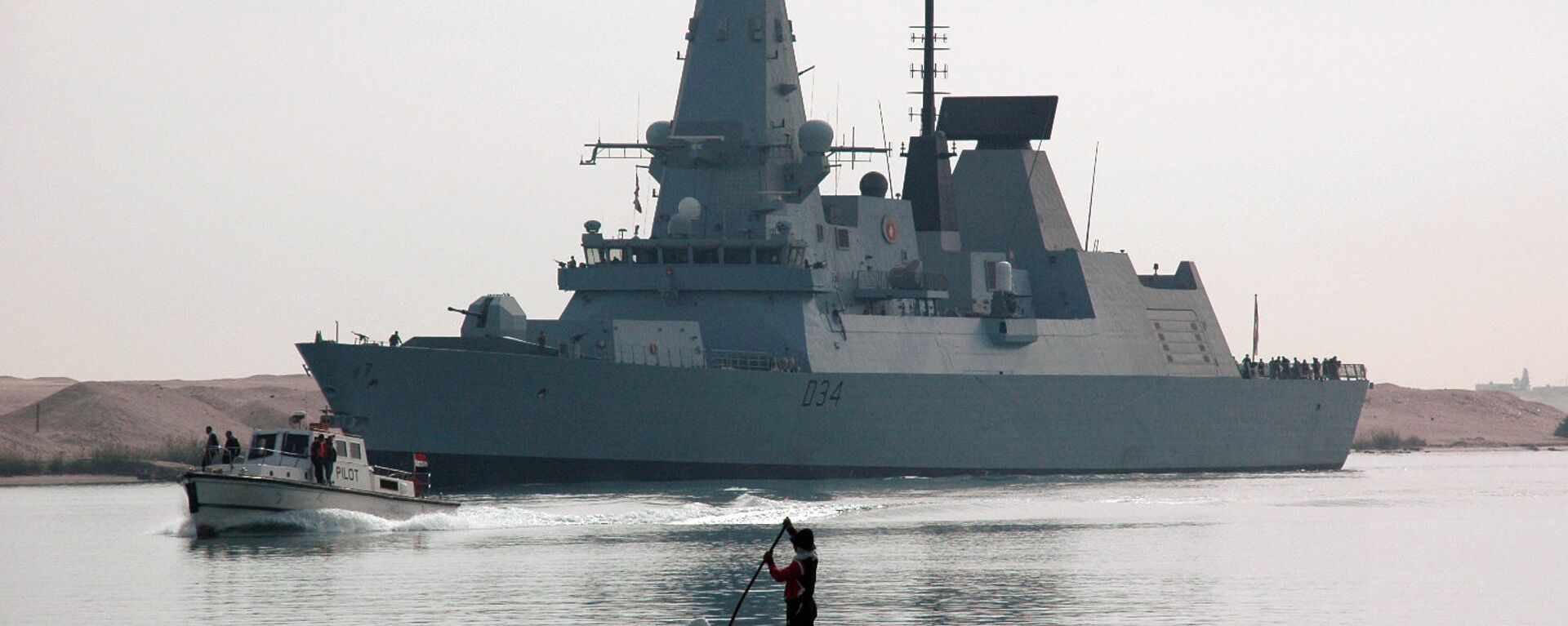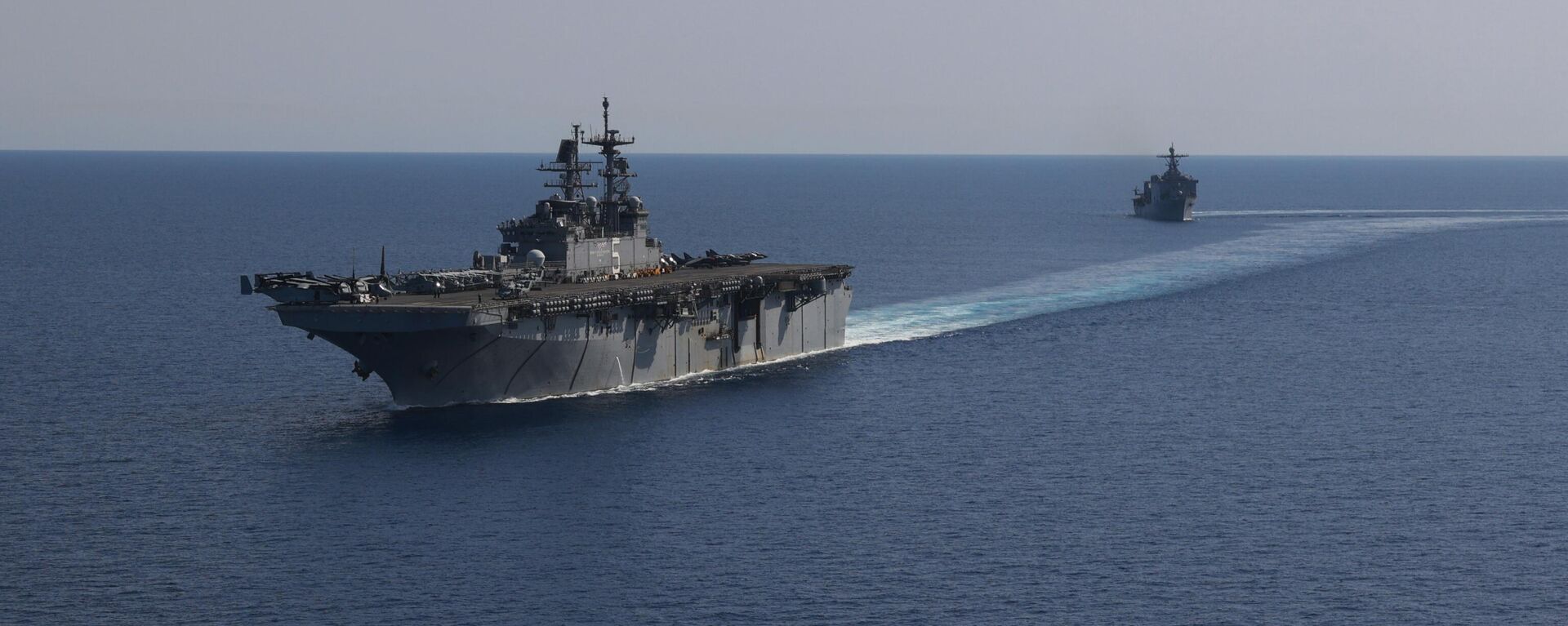https://sputnikglobe.com/20240312/houthis-vow-to-ramp-up-attacks-over-ramadan-as-red-sea-blockade-triples-costs-of-eu-emissions-1117286854.html
Houthis Vow to Ramp Up Attacks Over Ramadan as Red Sea Blockade Triples Costs of EU Emissions Scheme
Houthis Vow to Ramp Up Attacks Over Ramadan as Red Sea Blockade Triples Costs of EU Emissions Scheme
Sputnik International
The Yemeni militia’s three-and-a-half month long campaign of ship seizures, missile and drone strikes has added billions of dollars to global commercial shipping costs, with the fighters vowing to continue their partial blockade of the Red Sea until Israel halts the war in Gaza.
2024-03-12T17:48+0000
2024-03-12T17:48+0000
2024-03-12T17:48+0000
world
mohammed ali al-houthi
middle east
red sea
yemen
israel
houthi
houthis
european union (eu)
suez canal
https://cdn1.img.sputnikglobe.com/img/07e8/03/0c/1117286694_0:121:2329:1431_1920x0_80_0_0_56b5128a8f80de37bb3722bae4fcc1c5.jpg
The Houthis will continue their operations against Israel-affiliated commercial vessels and Western warships in the Red Sea throughout the holy month of Ramadan, militia spokesman Yahya Saree has announced.CENTCOM, the US combatant command responsible for operations across the Middle East, confirmed earlier in the day that the Houthis had fired two anti-ship ballistic missiles at the Pinocchio, a Liberian-flagged container ship.The 50,963 ton, 273-meter long vessel was reportedly on route from Jeddah to the Suez Canal zone, changing course following the attack away from Houthi-controlled territories. The ship’s captain said that there were no injuries onboard following the attack, which took place Monday.Houthi leader Sayyed Abdulmalik al-Houthi has similarly promised that the militia will continue its operations through Ramadan, which began on March 10 and is set to end on April 9.“Of course, targeting ships at sea is a complex operation,” al-Houthi said. “First of all, the ships are moving in the middle of the sea, some distancing themselves from Yemen’s shores. And some are far away to begin with, like ships targeted in the Arabian Sea…Then there are occupied provinces [of Yemen] that separate the Rocketry Force from the shores. For example, in operations carried out in the Gulf of Aden, in the Red Sea itself, ships distance themselves as far as possible from the coast of Hodeidah province. Their movement, camouflage and attempts to disguise themselves by turning off identification devices and through various other means…all of that has been surpassed...All of this is an achievement in every sense of the world,” the militia leader said.The US and Britain launched at least 15 airstrikes inside Yemen in the provinces of Sa’adah and Hodeidah over the past 24 hours as part of an ongoing attempt to degrade the Houthis’ drone and missile capabilities. The campaign has met with limited success, with at least 15 ships damaged, the UK-owned Rubymar fertilizer carrier sunk, two Navy Seals killed and two MQ-9 Reaper drones shot down by Yemeni air defenses since the US-led maritime operation began in December.Mohammad Ali al-Houthi, a senior member of Yemen’s Supreme Political Council, has called on Arab countries to airdrop weapons, ammo and even paratroopers into Gaza to help Palestinians in their fight against Israeli forces, calling it a “moral duty” and suggesting that only the arming of the population could “stop” the “genocide,” since attempts to cite international law have seemingly had no impact.The Houthis’ Red Sea campaign has caused tens of billions of dollars in losses to major shipping global companies, with commercial freight volume through the Red Sea, which ordinarily accounts for about 12 percent of all global shipping, down up to 80 percent since the militia began its attacks and ship seizures in November.The crisis has also wreaked havoc on other facets of Western economies, with media reporting Tuesday that Houthi attacks had almost tripled costs associated with the EU’s Emissions Trading System, which the bloc thought would serve as “a cornerstone of the EU’s policy to combat climate change.”Number crunchers at Clarsons Research estimate that container ship transits via the Red Sea have dropped by 91 percent since December, with 620 ships forced to take the long way round via the Cape of Good Hope, and bunker and crude tanker transits dropping 37 and 31 percent over the same period, respectively. The Cape detour has resulted in a tripling of fuel consumption, with ships sailing about 25 percent faster to account for lost time. The result has been a three-fold jump in EU ETS climate allowances, from an average of €98,000 to €285,000 per voyage, based on a carbon swap price of €55 per ton, according to Hamburg-based information services company Oceanscore.
https://sputnikglobe.com/20240312/uk-to-send-hms-diamond-destroyer-to-red-sea-to-rejoin-naval-mission---minister-1117285011.html
https://sputnikglobe.com/20240312/us-uk-carry-out-15-strikes-on-yemen-over-past-24-hours---reports-1117274886.html
https://sputnikglobe.com/20240311/houthis-vow-more-surprises-for-us-israel-while-schooling-west-in-asymmetric-warfare-1117271756.html
red sea
yemen
israel
Sputnik International
feedback@sputniknews.com
+74956456601
MIA „Rossiya Segodnya“
2024
News
en_EN
Sputnik International
feedback@sputniknews.com
+74956456601
MIA „Rossiya Segodnya“
Sputnik International
feedback@sputniknews.com
+74956456601
MIA „Rossiya Segodnya“
why can't us stop the houthis, what is houthi asymmetric warfare
why can't us stop the houthis, what is houthi asymmetric warfare
Houthis Vow to Ramp Up Attacks Over Ramadan as Red Sea Blockade Triples Costs of EU Emissions Scheme
The Yemeni militia’s three-and-a-half month long campaign of ship seizures, missile and drone strikes has added billions of dollars to global commercial shipping costs, with the fighters vowing to continue their partial blockade of the Red Sea until Israel halts the war in Gaza.
The Houthis will continue their operations against Israel-affiliated commercial vessels and Western warships in the Red Sea throughout the holy month of Ramadan, militia spokesman Yahya Saree has announced.
“We will continue to prevent navigation to the ports of occupied Palestine until the end of the aggression and the siege of Gaza,” Saree said in a statement on Tuesday, while reporting on “a targeted operation against the American ship ‘Pinocchio’ with naval missiles.”
CENTCOM, the US combatant command responsible for operations across the Middle East, confirmed earlier in the day that the Houthis had fired two anti-ship ballistic missiles at the Pinocchio, a Liberian-flagged container ship.
The 50,963 ton, 273-meter long vessel was reportedly on route from Jeddah to the Suez Canal zone, changing course following the attack away from Houthi-controlled territories. The ship’s captain said that there were no injuries onboard following the attack, which took place Monday.
Houthi leader Sayyed Abdulmalik al-Houthi has similarly promised that the militia will continue its operations through Ramadan, which began on March 10 and is set to end on April 9.
“We are entering the blessed month while engaging in a holy war to support the Palestinian people using missiles, drones, financial aid, and widespread popular mobilization,” al-Houthi said in a video address Monday. “When the United States observes missiles and drones approaching its warships, it perceives a significant level of popular support behind these actions,” he added, urging Yemenis to continue taking to the streets for mass demonstrations in support of the Houthi campaign.
“Of course, targeting ships at sea is a complex operation,” al-Houthi said. “First of all, the ships are moving in the middle of the sea, some distancing themselves from Yemen’s shores. And some are far away to begin with, like ships targeted in the Arabian Sea…Then there are occupied provinces [of Yemen] that separate the Rocketry Force from the shores. For example, in operations carried out in the Gulf of Aden, in the Red Sea itself, ships distance themselves as far as possible from the coast of Hodeidah province. Their movement, camouflage and attempts to disguise themselves by turning off identification devices and through various other means…all of that has been surpassed...All of this is an achievement in every sense of the world,” the militia leader
said.
The US and Britain launched at least 15 airstrikes inside Yemen in the provinces of Sa’adah and Hodeidah over the past 24 hours as part of an ongoing attempt to degrade the Houthis’ drone and missile capabilities. The campaign has met with limited success, with at least 15 ships damaged, the UK-owned Rubymar fertilizer carrier sunk, two Navy Seals killed and two MQ-9 Reaper drones shot down by Yemeni air defenses since the US-led maritime operation began in December.
Mohammad Ali al-Houthi, a senior member of Yemen’s Supreme Political Council, has called on Arab countries to airdrop weapons, ammo and even paratroopers into Gaza to help Palestinians in their fight against Israeli forces, calling it a “moral duty” and suggesting that only the arming of the population could “stop” the “genocide,” since attempts to cite international law have seemingly had no impact.
The Houthis’ Red Sea campaign has caused tens of billions of dollars in losses to major shipping global companies, with commercial freight volume through the Red Sea, which ordinarily accounts for about 12 percent of all global shipping, down up to 80 percent since the militia began its attacks and ship seizures in November.
The crisis has also wreaked havoc on other facets of Western economies, with media
reporting Tuesday that Houthi attacks had almost tripled costs associated with the EU’s Emissions Trading System, which the bloc thought would serve as “a cornerstone of the EU’s policy to combat climate change.”
Number crunchers at Clarsons Research estimate that container ship transits via the Red Sea have dropped by 91 percent since December, with 620 ships forced to take the long way round via the Cape of Good Hope, and bunker and crude tanker transits dropping 37 and 31 percent over the same period, respectively. The Cape detour has resulted in a tripling of fuel consumption, with ships sailing about 25 percent faster to account for lost time. The result has been a three-fold jump in EU ETS climate allowances, from an average of €98,000 to €285,000 per voyage, based on a carbon swap price of €55 per ton, according to Hamburg-based information services company Oceanscore.





